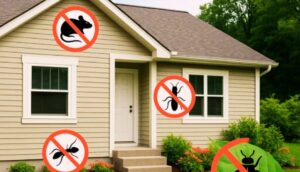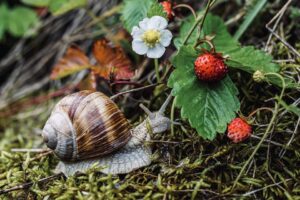Ways To Keep Rabbits Out of Your Garden

Rabbits may be cute and cuddly, but they visit home gardens doing lots of damage by feeding on veggies and other garden plants. If your garden is frequently visited by these critters making a meal out of your veggies before you have time to harvest them or nibbling on your prized flowering plants some steps can be taken to discourage them from your garden. However, in the wild, their natural habitat consists of grasslands, wetlands, deserts, woodlands, forests, meadows, agricultural sites, shrublands, mountains, and sand dunes.
Rabbit Identification
Rabbits are small and furry mammals with fluffy and short tails. Their hind legs are large and strong. They possess two pairs of sharp incisors (front teeth): one pair on top and the other on the bottom. In addition, rabbits have two peg teeth behind the top incisors.
Signs of the Presence of Rabbits
- Seeing them.
- Holes and scrapes may be seen in the lawn because of rabbit digging.
- Rabbit droppings or feces- A rabbit’s feces resembles a tiny marble, the color is typically brown or black. The fecal pellets are round small and uniform in size.
- Garden plants that have disappeared or eaten down to the roots.
- The shoots of herbaceous plants grazed to ground level.
- Plants have chewed marks.
- The bark at the base of tree trunks may be gnawed away, these gnawed marks are especially evident during the winter months when the snow makes vegetation unavailable.
- Evidence of digging around the perimeter.
11 Proven Methods to Keep Rabbits Out of Your Garden
1. Let your Dog and Cat do the Work: If you have a dog or a cat or even both, let your furry friends be on patrol in your garden. Cats and dogs in your garden will give rabbits a scare, and they won’t stay around. If you don’t have any dogs or cats but want to keep your garden free of rabbits, consider getting one or two dogs/cats and put them to work for a rabbit-free zone.
2. Install Plants Rabbits Hate: Just as rabbits are attracted to certain species of plants for a food source there are some plants that rabbits hate, why not install these plants in your garden to keep rabbits away? Some of these plants include marigolds, daffodils, catmint, lavender, Onion, yarrow, allium, astilbe, etc… these plants will also provide an abundance of flower blooms.
3. Add Physical Barriers: The addition of physical barriers can do the job of keeping rabbits from getting to your prized plants. Chicken wire is a great physical barrier, how does this work? Use a 1-inch mesh wire or smaller to construct a fence around your flower bed or garden. To ensure that the fence is secure dig at least 6 inches below the ground level because rabbits by nature are diggers.
4. A Raised Bed: Growing veggies and your favorite plants in a raised bed garden will keep them safe from rabbits, the raised bed garden should be about waist high.
5. Use Visual deterrents: Rabbits are not only frightened away by what they hear but also what they see, using fake owls and rubber snakes. Metal pinwheels that shine and give off a sound will get the rabbit’s attention. Hanging chimes will also help to keep rabbits away.
6. Protect Individual Plants: Smaller garden plants can be protected individually by placing a cage or chicken wire around them.
7. Use Rabbit Repellents: Repellents will repel and keep rabbits away, repellents can be purchased from your garden center or plant nursery. Before applying repellents read and follow the manufacturer’s directions for the best results. A Home-made remedy of a mixture of red pepper, garlic, and a strong-smelling soap solution in a 32 oz spray bottle and applied around the base of shrubs and trees or the perimeter of your garden bed will bring control. This solution can be applied once a week or if rain falls reapplication is needed for the solution to keep its effectives.
8. Use ultrasonic Deterrents: These devices give off different sounds or the frequencies on the device can change according to what pests you are trying to keep away from your garden. These devices can deter Dogs, rodents, bats, cats, opossums, deer, armadillos, skunks, raccoons, and even insects.
9 A Hanging Garden: A hanging garden or planter that is off the ground for example hanging baskets will keep your plants out of the reach of rabbits.
10. Install Motion Detectors Sprinklers: The installation of motion detectors will give rabbits a wet scare, when rabbits come in contact with detectors will automatically turn on which will send rabbits scurrying for cover.
11. Predator Urine: Applying predator urine in your garden is a great way to trick rabbits causing them to think that predators are around and will send rabbits hopping away.
Additional Information
- Removing the nesting site will cause rabbits to pack up and move on, the reason for this is rabbits love dense places using these areas as cover to hide from predators. clear away debris, weed patches, brush piles, and rock piles. An open area surrounding your garden will provide your garden plants with some limited protection.
- Rabbits are most active early in the morning or just before night falls.
Rabbit-Resistant Plants

Installing these Plants will discourage rabbits from your garden. These are just a few, there are many more.
- Sweet Alyssum
- Wax begonia
- Coral Berry
- Sunflower
- Butterfly bush
- Milkweed
- Snapdragon
- Lantana
- Rose of Sharon
Conclusion
10 Frequently Asked Questions (FAQs)
1. Q: What smells do rabbits hate the most in gardens?
A: Rabbits have super-sensitive noses and can’t stand strong scents like garlic, vinegar, crushed red pepper, or predator urine (like fox or coyote). Planting herbs like lavender, rosemary, or mint can also help deter them naturally. It’s like setting up a “no entry” sign made of smells!
2. Q: Do coffee grounds really keep rabbits away from plants?
A: Yes, to an extent! Used coffee grounds have a bitter smell that rabbits don’t like. Sprinkle them around the base of your plants. Bonus: they also enrich the soil — a win-win for your veggies and flowers!
3. Q: Are there plants rabbits won’t eat?
A: Absolutely! Rabbits typically avoid plants with strong scents or fuzzy leaves. Try planting marigolds, snapdragons, lavender, salvia, or lamb’s ear. These can create a natural “rabbit-resistant” border around your more vulnerable crops.
4. Q: How tall should a fence be to keep rabbits out?
A: A rabbit-proof fence should be at least 2 feet tall and made of ½-inch hardware cloth or chicken wire. For extra security, bury it 6–12 inches underground to prevent digging. Rabbits aren’t Olympic athletes, but they are sneaky diggers!
5. Q: Can motion-activated sprinklers help scare off rabbits?
A: You bet! These sprinklers detect movement and give trespassers a quick squirt of water. Rabbits are jumpy by nature, so even a gentle spray sends them hopping in the opposite direction.
6. Q: Are homemade rabbit repellents safe and effective?
A: Many homemade sprays made from garlic, hot pepper, or vinegar can work well — just be sure to reapply after rain. They’re safer than chemical repellents, but not foolproof. Think of them as part of your rabbit-fighting toolkit, not the whole toolbox.
7. Q: Will having a dog or cat keep rabbits out of my garden?
A: It often helps! Rabbits will steer clear if they smell or hear predators nearby. Even leaving some pet fur around your garden can be enough to spook them. Just make sure your pets don’t disturb your garden in the process!
8. Q: Do rabbit repellents harm plants or soil?
A: Most commercial repellents are plant-safe if used correctly. Still, it’s a good idea to test a small area first. For edible crops, look for non-toxic, food-safe repellents to protect both your harvest and the environment.
9. Q: How can I tell if rabbits are the ones damaging my plants?
A: Rabbits leave behind neat, clean bites — think of them as little plant surgeons! You might also spot small round droppings, tracks in the dirt, or nibble marks about a foot off the ground. Deer tend to leave ragged edges; rabbits are more precise.
10. Q: Are raised garden beds effective against rabbits?
A: Yes, especially if they’re at least 2 feet tall and have smooth sides. Add a mesh barrier around the top for extra protection. Raised beds also make gardening easier on your back — double bonus!
Discouraging rabbits from your garden may take some effort on your part but it’s a small price to pay when it comes to the protection of your veggies and prized flowering plants. This list of safe best practices has proven to give good results and will go to work for you as you work towards creating a rabbit-free zone.









